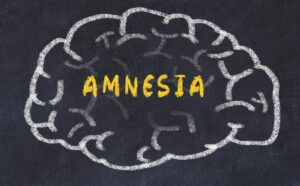Amnesia, Part I
A tale of three worlds.
If you plan to use amnesia in a novel, it’s important to know what type of amnesia your character has, how they got it, and what differences exist between the types.
Writers often use amnesia as a device to strip a character of important information and/or put them in a new situation. It’s seen frequently in rom-coms, where the heroine or hero falls for someone else than you’d expect. Then, their memory returns and barges right into that black moment.
Unfortunately, writers often forget and write amnesia wrong. (puns intended) Share on X
There are other forms of memory loss, such as amnesia from a seizure, dementia or brain tumor, but these articles will focus on the big three types:
1. Retrograde means past memories are lost.
2. Anterograde means new (current) memories can’t be made.
3. Transient Global Amnesia is a unique form of retrograde amnesia,
which lasts for less than a day,
but the sufferer can’t recall more recent events nor lay down new memories during the episode.

Amnesia
What is Transient Global Amnesia?
TGA is one of the three main types of amnesia, and the rarest. The title gives you a clue: it’s of short duration (less than 24 hours) and causes a significant loss of memory.
TGA may be the most interesting amnesia to those who’ve never suffered from it. People who’ve had TGA wouldn’t agree.
While working on this blog, I ran across a British author of six books, Maurice “Moz” Perkins, on X. Moz, a former sailor with the British Royal Navy, mentioned he’d had transient global amnesia. I grabbed the chance to interview him, of course.
Who better than a fellow writer to instruct other writers?
Maurice “Moz” Perkins
Secretary Stockport Armed Forces Community Organisation, Admin Stockport Armed Forces Breakfast Club, Member of the Royal Naval Association, Chair of the Hazel Grove branch, Member of the Royal British Legion, Stockport and Hazel Grove branches, Ambassador for Project RECCE
Me: What was the trigger for your attack?
Moz: I didn’t recognize the trigger. It was only in post-event discussions did it come to light. I had been on a conference call stood on the railway station and a long time later my colleagues said that I didn’t sound well and very distracted on the call. My only memory is sat on the train going into Manchester and seeing my reflection in the window. I have no memory of the telephone call.
Did they determine any physical reasons (stroke, etc.) – or see anything on the brain scan?
Moz: When I did collapse and the paramedics were called, they thought I was having a heart attack or a stroke. They put electrodes on me and I have a fleeting memory of hearing the sirens and seeing the reflection of blue lights in the window. There were no physical reasons detected. All the tests then and subsequently showed no abnormalities in any of my organs. It was decided by the neurologist that it had been caused by stress and that is how I have dealt with it.
Which scans/tests did they do?
Moz: I had an ECG in the ambulance, an MRI scan in the hospital and two more MRI scans in later months.
How long did your TGA last?
Moz: Approximately 7 hours, give or take ten to twenty minutes. (He did have associated migraines for about 6 weeks afterwards.)
How much retrograde (back) memory did you lose? Months, years, etc.
Moz: Initially the memory loss was absolute. The 7 hours or so are gone forever. My wife was with me and said I just kept asking, “Where am I ?” and “What’s happened ?” she would explain and seconds later I would ask again. She found it quite distressing. I didn’t know how many grandchildren I had or who I worked for. I couldn’t open my phone as I didn’t know the security code.
Did you get all your former memories back?
It took many months for most of my former memories to return. Some took longer. I went back to work after 7 months on a phased basis but my confidence to remember things wasn’t good. I had to be nudged for some things and it led (over a year later) to retiring early.
You implied you still have some deficits – do those hamper your writing?
I cannot be confident that what I can remember is true. It has left me with an increased but still minor, deficiency in dyslexia in both words and numbers. I find myself double checking things before I commit. It does impact on my writing, as I miss out words but more so on my confidence to write, if you can understand what I mean? Spell check and Grammarly are very helpful in keeping me on the straight and narrow.
Have you used your experience in one of your books?
Not yet but I wouldn’t rule it out. Despite being very transparent about what happened, talking on podcasts and I have also spoken at a number of events, it is still a sore subject to me. I do remember exactly the moment when I thought I was broken. Until then I had thought I had a physical problem but knowing that I hadn’t was a chastening exercise. I stood in the shower and sobbed. I thought that I would never work again and that no-one would want to know me. Then I pulled myself together and told myself off. I would not be afraid of what happened. I would talk about it openly. I am rough and tough enough to take any stick. However, I know that not everyone is like me and many would hide away what happened for fear of being mocked or losing face, losing their job and suchlike. That is one of the reasons I speak out about it and why I included it in my memoirs.
While it’s good TGA is temporary, its effects can linger a long time.
Moz did have a history of one migraine headache in the past. “The only migraine I ever had was one day in 1991 looking intently at a black signalling monitor under exam conditions, trying to pick out different coloured icons to control points and signals. My vision went as the headache started. I had to put the exam on hold and go lie down for a while.” (Honestly? This type of stress would give me a migraine, too!)
More recently, again interesting because Covid-19 is linked to TGA, Moz had another migraine: “The last one was last October for several hours I had an ocular migraine, it was a prelude to a bout of long covid. The “fluffiness” in my brain didn’t clear for six months. I’m still wrestling with a variety of medication changes trying to lower my High Blood Pressure.”
Moz fits all the classic criteria for TGA, and it’s easy to see how devastating this can be for anyone who has an episode of it.
Link to Moz’s books: https://www.amazon.co.uk/stores/Maurice%20Perkins/author/B08CM447T3
Connect with him on X, formerly known as Twitter, at: @MozPerkins
Facebook: https://www.facebook.com/MozPerkins/
Instagram: https://www.instagram.com/mozperkins/



Medical Criteria for a diagnosis of Transient Global Amnesia:
- Episode must be witnessed by another person
- Sudden onset with severe difficulty remembering current, new memories going forward.
- Episode lasts at least 1 hour, gone within 24 hrs.
- No focal neurological symptoms or deficits found. This means no other problems like weakness in the legs, or can’t walk, or having trouble seeing, etc.
- No other cognitive deficits are present such as dementia, seizures, etc.
- Episode did not cause loss of consciousness or disorientation to person. TGA patients don’t lose learned skills–they can still cook, drive a car, and walk in familiar surroundings like their home. They aren’t disoriented to person and know who they are. Can still recognize objects.
- No history of immediate preceding trauma or epilepsy.
- The repetitive questions asked by the patient are typical – what time is it? Where am I? How did I get here? What happened?
What writers need to know about this:
First described/recognized in 1956, so don’t use the term “TGA” before then.
Affects males and females equally.
All physician neurological testing is normal and brain scans are normal.
Sudden onset.
Usually strikes those between 40-80 years of age.
Episode length is commonly 1-8 hours.
Prior history of migraine is the only risk factor identified so far.
Affects only 3-8 people per 100,000 per year.
The past memory loss can stretch back from weeks to decades. Return of these memories is gradual, as experienced by Moz Perkins above.
Recipient must not have used drugs and alcohol just prior to the episode. The amnesia with these is distinsguisable from TGA.
15-20% of patients can have a later recurrence of TGA.
What did the film Fifty First Dates get wrong? They used TGA for the heroine,
but then had it reset the next day, and wipe her new memories daily.
TGA does not do that.
What sets off an episode of TGA?
Physical effort or exertion
Abrupt temperature changes (hot sauna to a cold bath e.g.)
Being around or on the water
Emotional stress
Possibly COVID-19 infection
Valsalva maneuver – abrupt holding of breath and bearing down (what happens when you cough)
Other symptoms that can be seen with the episode:
Nausea, Vomiting
Headache
Drowsiness, fatigue
Elevated blood pressure
Anxiety
How is TGA treated?
“Symptomatically” which means reassurance, rest, medications when needed for high blood pressure or vomiting,
What causes TGA?
It’s thought to be a problem in the hippocampus region of the brain,
but the cause is truly not known.

Deeper Dives:
New York Times writer, Trip Gabriel, wrote about his episode of TGA. His was probably brought on by a sailing race earlier in the day.
https://www.nytimes.com/2016/07/17/opinion/sunday/the-day-that-went-missing.html
https://tinyurl.com/TGA-STAT-Pearls-NIH
https://www.mayoclinic.org/diseases-conditions/transient-global-amnesia/symptoms-causes/syc-20378531
https://www.aafp.org/pubs/afp/issues/2022/0100/p50.html
The film Fifty First Dates got total global amnesia wrong. Click here to learn why! Share on X


